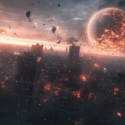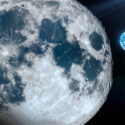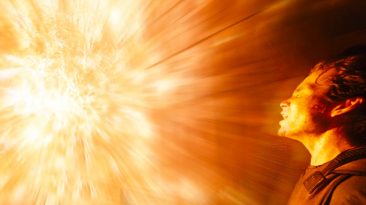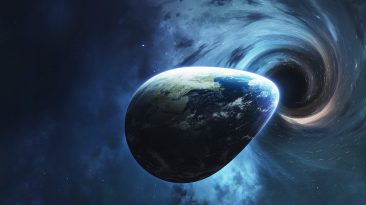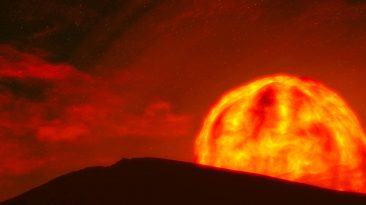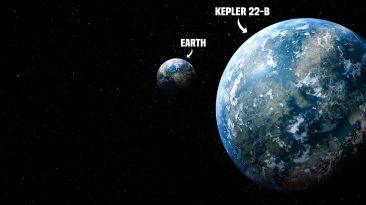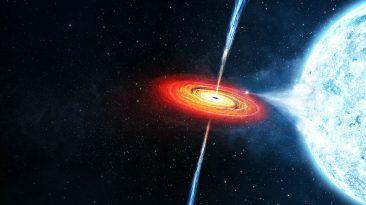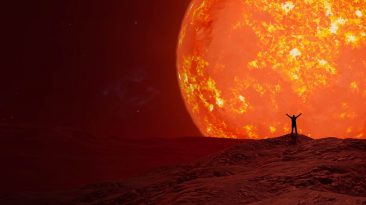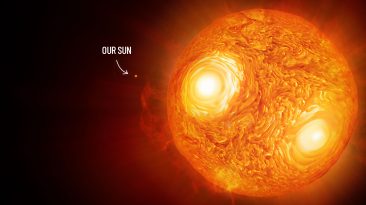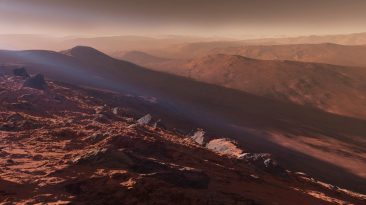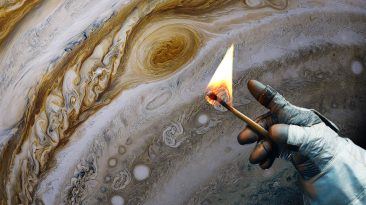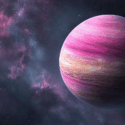The biggest planet in the Solar System. And the smallest star in the known Universe. Today, they are on a collision course. And Earth might not survive this. Meet the star with a catchy name, EBLM J0555-57Ab. Its gravity is 300 times that of Earth’s. And it’s about the size of our Saturn. EBLM J0555-57Ab is a red dwarf and the smallest star we’ve ever discovered.
Usually, it resides 600 light-years away from us, in its own double-star system. But not today. Today, it broke the cosmic speed limit and rushed toward our Solar System to meet with the biggest gas giant in it. Jupiter. Jupiter is huge. It’s about 11 times larger than Earth. It’s even bigger than the red dwarf star coming its way. But because it’s mostly made of hydrogen, it’s not massive enough to be a star.
To start converting all its hydrogen into helium and turn into a red dwarf, Jupiter would need to be at least 80 times more massive than it is today. So what would happen if these two giants collided? Before the interstellar red dwarf could even make it to Jupiter, it would have to pass through the Oort Cloud.
The Oort Cloud is a collection of icy comets and other bodies on the edge of our Solar System. As the smallest star in the known Universe was passing that icy debris, it would wreak big havoc in our planetary neighborhood. It would send icy comets our way. And some of them would start hitting Earth.
We’d have to think of a way to protect our planet from this comet shower. But the time would not be on our side. Because the smallest star in the Universe would keep moving toward Jupiter.
Our stellar guest might be smaller in size than Jupiter. But it sure would be more massive. EBLM J0555-57Ab’s gravitational pull would start to tug on the planet. And don’t forget that we’d now have a second star in our Solar System. Things would start getting hot. All the heat from the red dwarf plus its strong gravity would make Jupiter grow in size.
The gas giant’s atmosphere would puff up as all the gases were heating up and expanding. Some of Jupiter’s atmosphere would start to escape into space and toward the stellar intruder. Eventually, all the runaway Jupiter gases would form a hot ring around EBLM J0555-57Ab. It would look as if we had a black hole in the Solar System. Only it would be really bright.
The red dwarf star would keep slowly ripping Jupiter apart. Now it would be eating whole chunks of our gas giant. For a moment, Jupiter would take a shape of an American football. But soon enough the star would engulf it entirely. Sorry Jupiter, you didn’t stand a chance. Now we’d be in a real pickle. Jupiter would no longer exist in the Solar System. And now we’d have an alien red dwarf star surrounded by a ring of hot gases.
Our Solar System wouldn’t be the same without Jupiter. This gas giant wasn’t here for a cool view. Jupiter’s gravity usually attracts asteroids and comets that make it into our planetary neighborhood. It gobbles them up before they make it further into the Solar System. With no Jupiter to protect us from all the space rocks, Earth would start getting bombarded by all kinds of debris. Icy comets, asteroids, you name it.
Every day, we’d be hit by about 170 meteors, comets and asteroids. That’s 10 times more than what’s making it to our planet right now. Life here would sure get more dangerous. Who knows how long before one really big asteroid would come and destroy all life on our planet. But things would get even worse. Having another star in our Solar System would disrupt the orbits of all the planets it passed. Including Earth’s.
Of course, it would take EBLM J0555-57Ab millions of years to rampage all the way to our Sun. So you might stay alive long enough to witness the epic slow-motion chaos. Unless the red dwarf sent another planet on a collision course with us. Yeah, that would end things much, much quicker. All the planetary collision in the Solar System would create a rippling effect. The planetary orbits would get disrupted even more as the time passed.
Earth could even get knocked out of its orbit entirely. This would send you and everything else on the planet into a rogue trip across the Universe. Without the Sun to gives us warmth, the Earth would turn into a frigid, lifeless rock very soon. If you somehow survived to this point, you wouldn’t have long now. Now, of all the things that could enter our Solar System, the smallest star in the Universe might not be the worst.
Sources
- “Why Do Stars Burn and What Happens When They Die?”. Andrew Zimmerman Jones. 2019. thoughtco.com.
- “Could Jupiter Ever Ignite Into A Star?”. 2019. newscientist.com.
- “Stellar Classification | National Schools’ Observatory”. 2022. schoolsobservatory.org.
- “Astronomers Find The Smallest Star Yet”. Deborah Byrd. 2017. earthsky.org.
- “Astronomers Discover Tiny, Planet-Sized Star”. Anthony Wood. 2017. newatlas.com.





